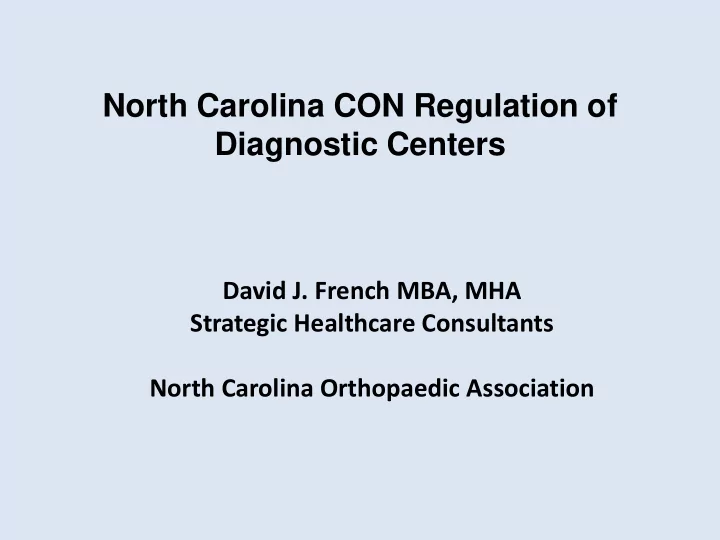

North Carolina CON Regulation of Diagnostic Centers David J. French MBA, MHA Strategic Healthcare Consultants North Carolina Orthopaedic Association
North Carolina CON Regulation of Diagnostic Centers CON regulation of “ diagnostic centers ” should be eliminated because the rule is poorly defined, often misinterpreted or ignored by providers, and rarely enforced .
North Carolina CON Regulation of Diagnostic Centers § 131E-176. Definitions. (7a) "Diagnostic center" means a freestanding facility, program, or provider, including but not limited to, physicians' offices, clinical laboratories, radiology centers, and mobile diagnostic programs, in which the total cost of all the medical diagnostic equipment utilized by the facility which cost ten thousand dollars ($10,000) or more exceeds five hundred thousand dollars ($500,000). In determining whether the medical diagnostic equipment in a diagnostic center costs more than five hundred thousand dollars ($500,000), the costs of the equipment, studies, surveys, designs, plans, working drawings, specifications, construction, installation, and other activities essential to acquiring and making operational the equipment shall be included. The capital expenditure for the equipment shall be deemed to be the fair market value of the equipment or the cost of the equipment, whichever is greater.
CON Regulation of Diagnostic Centers Having a $500,000 threshold for a diagnostic center makes it difficult and burdensome for non-hospital providers to obtain digital radiography equipment, digital mammography equipment, ultrasound units, and other diagnostic equipment that are not specifically regulated by CON law. A CON application to acquire replacement or additional diagnostic equipment can cost $20,000 or more to prepare. If it is challenged by a hospital or other providers the legal costs could be hundreds of thousands of dollars. Consequently, the current CON regulation of a diagnostic center Restricts the replacement outdated equipment with safer, digital equipment that can transmit images and greatly reduces the need for a patient to have repeated diagnostic tests.
CON Regulation of Diagnostic Centers Eliminating CON regulation of diagnostic centers should not create any unintended consequences because: Existing centers can be given the choice of maintaining their status as institutional health service facilities. The CON law can be easily amended to include exemptions to allow the change in ownership of the equipment that is owned by CON-approved diagnostic centers.
Recommend
More recommend